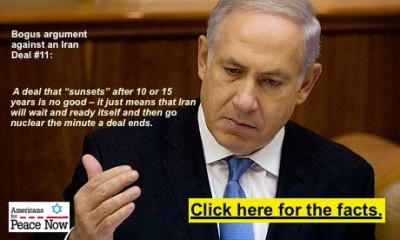 A deal that “sunsets” after 10 or 15 years is no good – it just means that Iran will wait
and ready itself and then go nuclear the minute a deal ends.
A deal that “sunsets” after 10 or 15 years is no good – it just means that Iran will wait
and ready itself and then go nuclear the minute a deal ends.
- Just as there is no possibility of a “zero enrichment” deal with Iran, there is no possibility of Iran agreeing to a “permanent” deal on its nuclear program. Iran is in trouble right now because it has repeatedly violated the Treaty on the Non-Proliferation of Nuclear Weapons (NPT), resulting in sanctions. Negotiations over Iran's nuclear program are grounded in the understanding that by demonstrating compliance with all of its NPT obligations, Iran will no longer be in violation of the NPT and Iran’s tenure in the international doghouse – at least with respect to its nuclear program – can come to a close (at least so long as Iran remains in compliance).
- An Iran nuclear agreement – whether its provisions are in place for 10 years, or 15 years, or however many years are agreed on – would dramatically mitigate the threat of Iran acquiring nuclear weapons. For the period of the deal, the agreement would dramatically curtail Iran’s nuclear program, extending breakout time from a couple of months to a year, making it much harder for Iran to shift course and making the path to weaponization far longer than it would be without an agreement.
- At the time that an agreement sunsets (and different provisions would likely sunset at different times), Iran would still remain a member of the NPT and subject to the requirements of that treaty. Iran would also remain bound by an Additional Protocol to the treaty, granting UN inspectors greater authority in monitoring Iran’s nuclear program. Following a decade or more of intrusive inspections and other oversight mechanisms, the U.S. and international community would at that time also be in a far stronger position to judge Iran’s actions and intentions vis-à-vis its nuclear program than they would have been without a deal. If, subsequent to a deal “sunsetting,” they determine that Iran’s leaders are shifting course and pursuing weaponization, the U.S. and international community will have ample time and opportunity to take action – and their decisions at that time will benefit from more than a decade of insights into Iran’s nuclear program and more than a decade of improved planning based on those insights.
- Optimally, by the time a deal sunsets Iran would recognize the tangible benefits of continued curtailment of its nuclear program – benefits that would be imperiled if, in the period after an agreement “sunsets,” Iran decided to shift course and pursue weaponization of its nuclear program.
Click here for our full report covering the 11 most common bogus arguments Israeli Prime Minister Netanyahu and other opponents of an Iran deal are making.